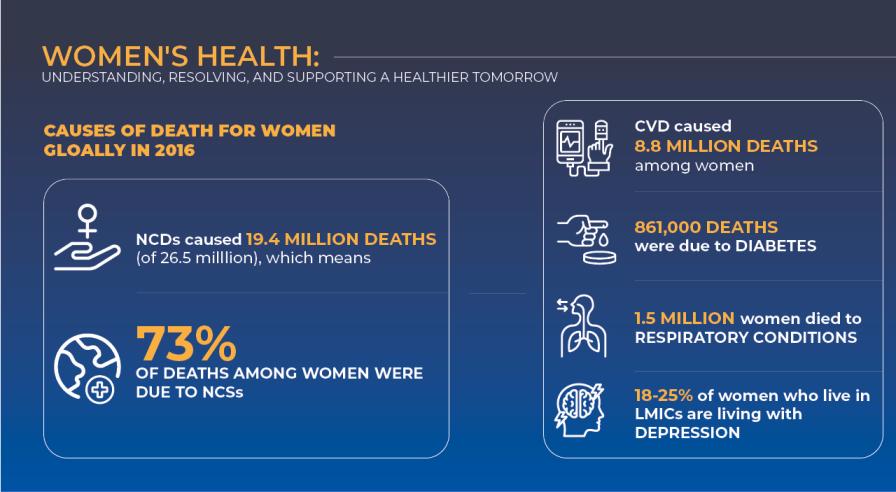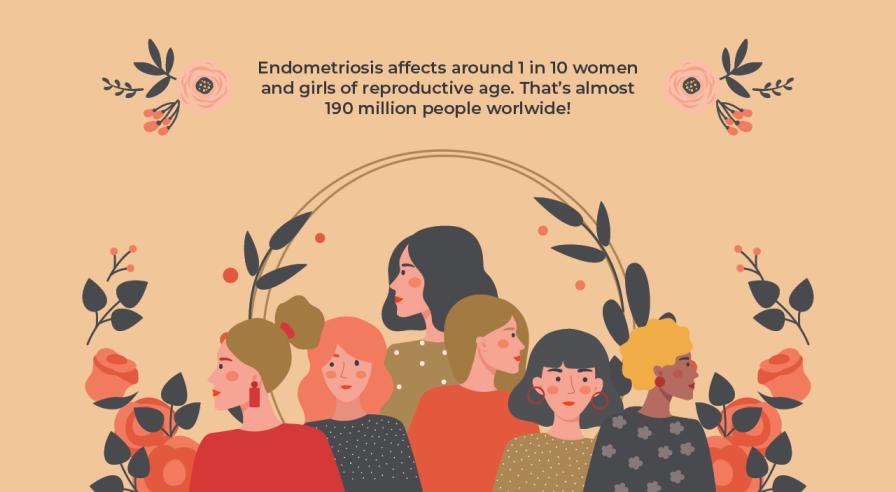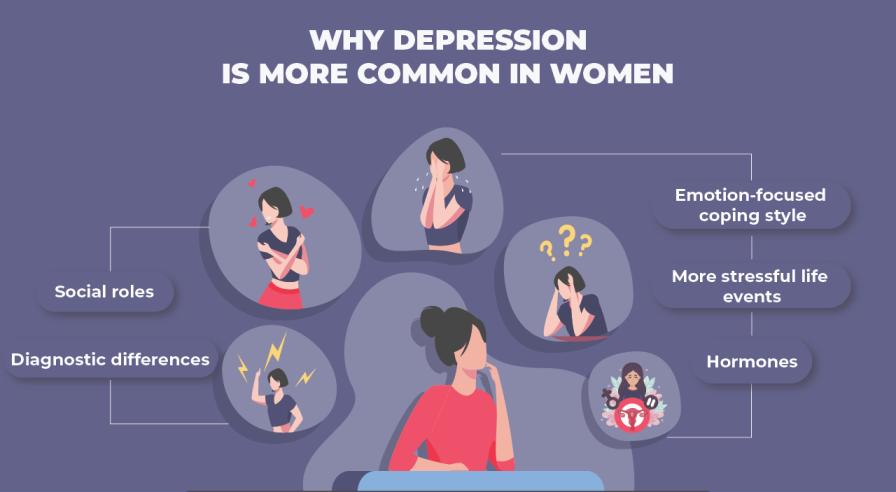Introduction
Gender plays a significant role in shaping individuals' access to and experiences with healthcare services. Gender significantly influences health outcomes due to both biological and sociocultural factors. Women and girls, in particular, face health disparities rooted in discrimination and social norms. Factors such as unequal power dynamics, limited educational and employment opportunities, and societal emphasis on reproductive roles contribute to these disparities. In addition, women and girls are more vulnerable to experiences of violence, further impacting their health. Poverty exacerbates these disparities, disproportionately affecting women and girls through issues like malnutrition and exposure to unsafe cooking fuels, leading to conditions like COPD.
Women's health encompasses a range of physical, mental, and social aspects specific to women. It includes reproductive health, which involves menstruation, fertility, pregnancy, childbirth, and menopause. In addition, women's health addresses issues such as breast and cervical cancer, sexually transmitted infections (STIs), osteoporosis, and other conditions that affect women disproportionately or differently than men. Mental health is also a critical component, considering factors like depression, anxiety, and postpartum depression that can impact women's well-being. Access to healthcare services, education, and empowerment are vital for promoting and maintaining women's health across the lifespan.
Elevate Your Women's Health Awareness: Explore Prevention and Well-being Resources. Click Here for Access to Support and Information. Visit Data Bridge Market Research for Expert Insights and Analysis on Women's Health Trends.
https://www.databridgemarketresearch.com/reports/global-womens-health-market
Navigating the Complexities of Women's Health
Health services must be affordable, accessible, and respectful to all individuals, ensuring quality and equity in delivery. Women and girls often encounter greater challenges than men and boys in accessing healthcare due to gender inequality and discrimination. As a result of these barriers, women and girls are at higher risk of various health issues such as unintended pregnancies, sexually transmitted infections including HIV, cervical cancer, malnutrition, vision problems, respiratory infections, and elder abuse. Additionally, they face high levels of violence, including intimate partner violence and harmful practices like female genital mutilation and child, early, and forced marriage.
Challenges in Health Faced by Women Due to Gender and Discrimination
Cancer
Breast cancer is one of the most common cancers in women worldwide, with a higher incidence compared to men. Regular screening methods such as mammograms and early detection are crucial for improving treatment outcomes. Cervical cancer, primarily caused by HPV, affects women's reproductive health. Vaccination against HPV and regular Pap smears are essential for early detection and prevention. Osteoporosis, characterized by weak and brittle bones, is more prevalent in women, especially after menopause due to hormonal changes. Adequate calcium intake, vitamin D, and weight-bearing exercises are key for reducing the risk of osteoporosis-related fractures. These diseases impact women's physical health, emotional well-being, and overall quality of life. Early detection, prevention, and management strategies are crucial in addressing these health challenges and improving women's health outcomes.
Empower Yourself with Breast Health Awareness: Explore Early Detection and Prevention. Click Here for Access to Resources and Support. Visit Data Bridge Market Research for the latest trends, forecasts, and comprehensive analysis.
https://www.databridgemarketresearch.com/reports/global-breast-cancer-liquid-biopsy-market
Iron Deficiency Anemia
Iron deficiency anemia is a common condition among women, particularly during pregnancy and menstruation, due to the loss of blood and increased demand for iron. Anemia can lead to symptoms such as fatigue, weakness, and pale skin, impacting women's daily activities and quality of life. During pregnancy, iron deficiency anemia can increase the risk of preterm delivery and low birth weight, affecting both the mother and the baby's health. Menstruating women may experience more severe symptoms during their periods, further affecting their well-being.
Reproductive Health Issues
Women face a range of reproductive health issues throughout their lives, including menstrual disorders, infertility, and menopause-related symptoms. Menstrual disorders like irregular periods, heavy bleeding, or severe cramps can significantly impact a woman's quality of life and may indicate underlying health issues that require medical attention. Infertility, which affects about 10% of women of reproductive age, can be emotionally challenging and often requires specialized medical care. Menopause, typically occurring around age 50, marks the end of a woman's reproductive years and is accompanied by symptoms like hot flashes, night sweats, and mood changes. These symptoms can vary in severity and duration, impacting a woman's daily life and emotional well-being. Access to reproductive healthcare services, including regular gynecological check-ups, contraceptive counseling, and menopause management, is crucial for women to address these issues and maintain their reproductive health.
Autoimmune Diseases
Autoimmune diseases, including lupus, rheumatoid arthritis, and multiple sclerosis, disproportionately affect women, with the prevalence being much higher compared to men. These conditions occur when the immune system mistakenly attacks the body's tissues, leading to chronic inflammation and damage to organs and tissues. The impact of autoimmune diseases on women can be significant, affecting their daily lives, mobility, and overall quality of life. These diseases often result in chronic pain, fatigue, and other debilitating symptoms that can make it challenging to perform daily activities and maintain social and work-related responsibilities. Furthermore, autoimmune diseases can also affect women's reproductive health and pregnancy outcomes.
Urinary tract infections (UTIs)
Urinary tract infections (UTIs) are a common health issue for women, primarily due to their shorter urethras compared to men, which makes it easier for bacteria to enter the bladder. UTIs can cause symptoms such as a strong, persistent urge to urinate, a burning sensation during urination, passing frequent, small amounts of urine, and cloudy or strong-smelling urine. UTIs can impact women's daily lives, causing discomfort and inconvenience. Recurrent UTIs can also lead to complications such as kidney infections if left untreated. Preventive measures such as staying hydrated, urinating after sexual intercourse, and practicing good hygiene can help reduce the risk of UTIs.
Empower Your Urinary Tract Health: Discover Prevention Tips and Treatment Options. Click Here for Resources and Support. Visit Data Bridge Market Research for Expert Insights and Analysis on UTIs.
Violence Against Women
Violence against women is a pervasive issue, with physical and sexual violence being particularly harmful. Statistics show that one in three women under 50 has experienced such violence from a partner or non-partner, impacting their physical and mental well-being. Health workers play a crucial role in identifying and preventing violence, as well as providing support to those affected.
Mental Health
Mental health is another area where women face challenges, being more susceptible to conditions like anxiety, depression, and unexplained physical symptoms. Depression, in particular, is prevalent among women, and suicide rates are high among women under 60. It is essential to raise awareness about mental health issues among women and encourage them to seek help when needed.
Women's Health: A Cornerstone of Societal Well-being
Women's health is not just a personal issue; it's a fundamental aspect of societal health and prosperity. When women are healthy, societies thrive. Women are often the primary caregivers in families, and their health directly impacts the well-being of children and the elderly. Maternal health is crucial for the health of future generations, as healthy mothers are more likely to give birth to healthy children. Additionally, women's economic participation is linked to their health; healthy women are more productive at work and contribute more effectively to their communities. Addressing these challenges requires not only access to quality healthcare services but also efforts to tackle underlying sociocultural norms and inequalities that contribute to women's health disparities. By promoting gender equity and ensuring comprehensive, gender-sensitive healthcare, we can improve women's health outcomes and enhance their overall well-being. Women's health issues, therefore, are not just a matter of individual rights but a strategic investment in the overall health and prosperity of society.
Uncover the Landscape of Women's Health with Expert Insights and Strategies from Data Bridge Market Research. Discover Trends, Forecasts, and Comprehensive Analysis to Unlock Your Market Potential. Visit Today!
https://www.databridgemarketresearch.com/reports/global-womens-health-diagnostics-market
Conclusion: Addressing Disparities for Better Outcomes
Women's health is a multifaceted issue influenced by biological, social, and environmental factors. Gender disparities and discrimination play a significant role in shaping women's health outcomes, leading to unique challenges and health risks throughout their lives. From reproductive health issues to chronic conditions like autoimmune diseases and cancer, women face a range of complex health concerns that require tailored approaches to prevention, diagnosis, and treatment. The organization and provision of health services can either facilitate or hinder access to information, support, and care, ultimately impacting health outcomes. These challenges include limited mobility, lack of decision-making power, lower literacy rates, and discriminatory attitudes from communities and healthcare providers. Moreover, healthcare providers and systems may lack the necessary training and awareness to address the specific health needs and issues faced by women and girls.












